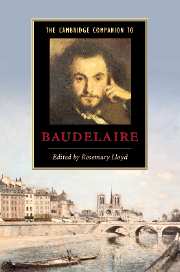Book contents
- Frontmatter
- 1 Charles Baudelaire, a life in writing
- 2 Baudelaire’s politics
- 3 Baudelaire’s poetic journey in Les Fleurs du Mal
- 4 Baudelaire’s versification: conservative or radical?
- 5 The prose poems
- 6 Baudelairean ethics
- 7 Baudelaire’s Paris
- 8 Baudelaire and intoxicants
- 9 Art and its representation
- 10 Music and theatre
- 11 Baudelaire’s literary criticism
- 12 Baudelaire’s place in literary and cultural history
- 13 A woman reading Baudelaire
- 14 Translating Baudelaire
- 15 The stroll and preparation for departure
- Afterword
- Appendix Titles of individual poems and prose poems referred to in the text
- Guide to further reading
- Index
- Index to Baudelaire’s works
- Series list
10 - Music and theatre
Published online by Cambridge University Press: 28 August 2006
- Frontmatter
- 1 Charles Baudelaire, a life in writing
- 2 Baudelaire’s politics
- 3 Baudelaire’s poetic journey in Les Fleurs du Mal
- 4 Baudelaire’s versification: conservative or radical?
- 5 The prose poems
- 6 Baudelairean ethics
- 7 Baudelaire’s Paris
- 8 Baudelaire and intoxicants
- 9 Art and its representation
- 10 Music and theatre
- 11 Baudelaire’s literary criticism
- 12 Baudelaire’s place in literary and cultural history
- 13 A woman reading Baudelaire
- 14 Translating Baudelaire
- 15 The stroll and preparation for departure
- Afterword
- Appendix Titles of individual poems and prose poems referred to in the text
- Guide to further reading
- Index
- Index to Baudelaire’s works
- Series list
Summary
What I’ve always found most beautiful in a theatre . . . is the chandelier – a beautiful object, luminous, crystalline, complicated, circular and symmetrical . . . After all, the chandelier has always appeared to me as the principal actor, seen through the large end or the small end of the lorgnette.
[Ce que j’ai toujours trouvé de plus beau dans un théâtre . . . c’est le lustre – un bel objet lumineux, cristallin, compliqu´e, circulaire et symm´etrique . . . Aprés tout, le lustre m’a toujours paru l’acteur principal, vu à travers le gros bout ou le petit bout de la lorgnette.
(OC i 682)]Exploring the interaction of music and theatre in Baudelaire's writing is a somewhat delicate and perplexing task, rather like examining the patterns of reflection and refraction from a complicated chandelier. Shining everywhere as a poet, widely recognised as a luminous translator and a brilliant art critic, Baudelaire is rarely counted among notable music critics and figures nowhere as either a theatre critic or a dramatist. Yet if music and theatre play supporting rather than starring roles in Baudelaire's works, they are nevertheless indispensable to the lighting of the whole production.
It seems deceptively simple to glance over Baudelaire's written contributions to the worlds of music and drama, as if scanning them through the wrong end of a telescope. His lone foray into music criticism, an essay entitled 'Richard Wagner et Tannhäuser à Paris', first appeared on 1 April 1861 in the Revue européenne, and E. Dentu published a slightly expanded version in booklet form on 4 May of the same year. Baudelaire was more active in literary criticism but seldom dealt with the theatre, publishing only such bits and pieces as a couple of short articles on the actor Philibert Rouvière (1855 and 1865) and a brief attack against 'Honest Plays and Novels' ['Les Drames et les romans honnêtes'] (1851).
- Type
- Chapter
- Information
- The Cambridge Companion to Baudelaire , pp. 145 - 163Publisher: Cambridge University PressPrint publication year: 2006



